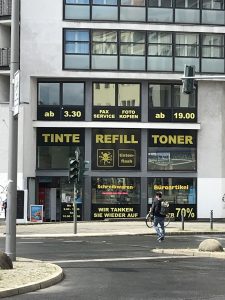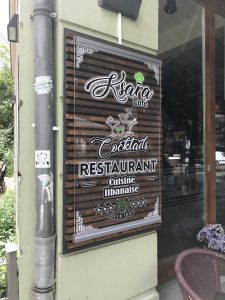The linguistic landscape of Berlin is one that communicates the growing importance of English to the German economy while holding on to the German language roots that construct the foundation of the city. Although the vast presence of the English language in Berlin is undeniable, it’s clear that the German local population puts great value in their native language.
Berlin is a city of many languages. German, of course, is the most commonly heard on the street. This is true in any neighborhood, even ones with large immigrant populations such as Kreuzberg. In areas that wouldn’t be considered ‘tourist areas’, it is relatively uncommon to have English translations on road signs or shop windows. Public transportation signs and storefronts are almost always in German. And, even when Germans are fluent in English and they are confronted with someone who is clearly an English speaker (for example, a group of Americans speaking English), that German will typically still try to speak German to them. Additionally, it is important to acknowledge the variable of public vs. private spaces, just as Leeman and Modan do (Leeman & Moden, 2009). There’s definitely a difference in the languages you’ll see and hear depending on what kind of space you’re in. In public spaces, German is very common, and there is not much English to be found. In private owned spaces, like stores or restaurants, there’s more German than English, but most people speak English and you’ll hear it more often. Most signage will be in German, but the employees and customers speak English freely. At first glance, it may appear to be a monolingual environment but it is actually a multi-lingual mixing pot. In public buildings like city museums, you’ll see lots of English, catering to tourists.
One of the most interesting things about Berlin is that when English does appear on signs, it is usually casually mixed into German. Instead of there being two separate translations of German and English, there will be one sign with the two languages mixed together. The two images attached to this blog post are examples of this. The first, a copy shop, has both German and English mixed together on the storefront. The second, a restaurant, mixes a predominantly English sign in with the German spelling of “Lebanese”. This integrated language landscape points towards how deeply rooted English has become in Berlin, with the two languages interchangeably flowing back and forth.


English has a strong hold on business life in Berlin. As Leeman and Moden explain, the shape of a linguistic landscape can tell us a lot about the power dynamics of an environment. Because of the tourism industry in Berlin and the quickly expanding tech and startup industries, the integration of the English language was inevitable. Any workplace in Berlin that has some reach beyond Germany will generally conduct itself in English. Even workplaces that only operate in the German-speaking region in Europe will speak primarily English. For example, I work at a clean-tech startup accelerator here in Berlin. Even though the accelerator only coordinates startups in Germany, Austria, and Switzerland, all business is conducted in English and they only taken English language applications. At all museums or tourist sites, everything has an English translation. These are examples of the power of English in the Berlin economy. It helps connect across borders and draw in money from travellers.
The linguistic landscape of Berlin is telling or the economic and cultural conditions of the city. It is one with a large immigrant population and a young international tech industry. It is one with great pride in its native language. It is one looking to take as much advantage of tourism dollars as possible. The presence of German and English in Berlin tell a story of the way English has been integrated into Berliner life in order to advance the development of the area. The power of English as a money making tool and an international business language has allowed it to take a strong hold of Berlin. But, the native pride in the German language has ensured that whenever possible, German is used rather than English.
Works cited:
Leeman, Jennifer and Gabriella Modan. 2009. “Commodified Language in Chinatown: A contextualized approach to linguistic landscape.” Journal of Sociolinguistics, 13(3): 332-362.

It’s so interesting that despite of the integration of English in Germany, there is an appearance of “monolinguistic environment” as people still choose to speak and use German in daily life, as a result of “pride of nation”. I think many European countries have the same situation, for example, when I stayed in Paris, people who could speak English would still speak French to me. It is also surprising to notice that English is a primary language to use in workforce, since I expected that people would communicate in German at work, making working in Germany rather difficult due to the language barrier; however, the prevalence of English use does sound attractive to foreigners who don’t speak German but want to work there.
I used to feel that Germany was like an exclusive country; however, after reading this blog I found it rather fascinating as this country tries so hard to maintain its cultural importance and not to be overly affected by other languages, like English.
It’s interesting to see the mixing of languages on signs! We’ve talked a lot about what languages are displayed on signs and advertisements and where they are placed, what comes first, etc. but we haven’t talked much about the implications of combining to languages. I would be curious to know when that started cropping up, and how it related to the status of the English-speaking side of business in Germany.
I think it very fascinating that the use of English in Berlin seems to reflect the necessity of its use but also the push towards keeping the use of German alive. To me, it sounds like English became popular in the mid 20th century, and it began to push German out a bit, and once people realized that was happening, they are making an effort to revitalize their native language without phasing out the economic benefits that English brings.
It is very impressive that Germany society emphases the popularity of English usage among cities. Your findings from this marvelous linguistic landscape really leaves readers a deep consideration about language relationship between English and German rooted inside Germany people. Also, the introduction of other European countries gives people more information about English permanence happening among the world.
It seems as though the preferred language of the locals is German and they take pride in keeping the language alive. That being said, because Germany is so diverse, at this point, it seems like the easiest way they can conduct business is through English. I wonder in the following years, as tech in Germany continues to grow, if the rate at which English is used will grow as well; and if English continues to expand will there ever be a push back in order to keep the German language alive?
I wonder if since English is largely used transactionally, and in business setting, that the English that the German people in Berlin speak has a distinct transactional tone. I also know that German has a very distinct word structure/syntax. I’ve been told that it is an efficient language. Have you noticed this? If so, do you think it effects the way they speak English in general?
It’s interesting to find so many parallels in Berlin’s linguistic landscape with Hong Kong’s. As you mentioned about Berlin, a distinction between public and private spaces exist in Hong Kong as well, with almost all individuals speaking Cantonese in public spaces, but more English and Mandarin sprinkled within private spaces like stores and international companies. I also find the parallel in your description of Germany having a seemingly monolinguistic environment too.
As someone who has never been to Germany, I am genuinely surprised by the wide usage of English. As I’ve noticed living in Singapore, English has a very substantial presence, but there is still active efforts made to employ the native languages as well.
Hey Gabi!
I really enjoyed reading your piece 🙂
I wonder if the increasing use of English has anything to do with the increasing number of immigrants, who at least initially only speak English, then learn German.
It’s so interesting to compare how national pride influences a country’s landscape in different places. Singapore is popular for Singlish, which some argue to be illiterate while others view as a form of identity.
I hope you visit some Syrian desserts shops in Berlin while you’re there!